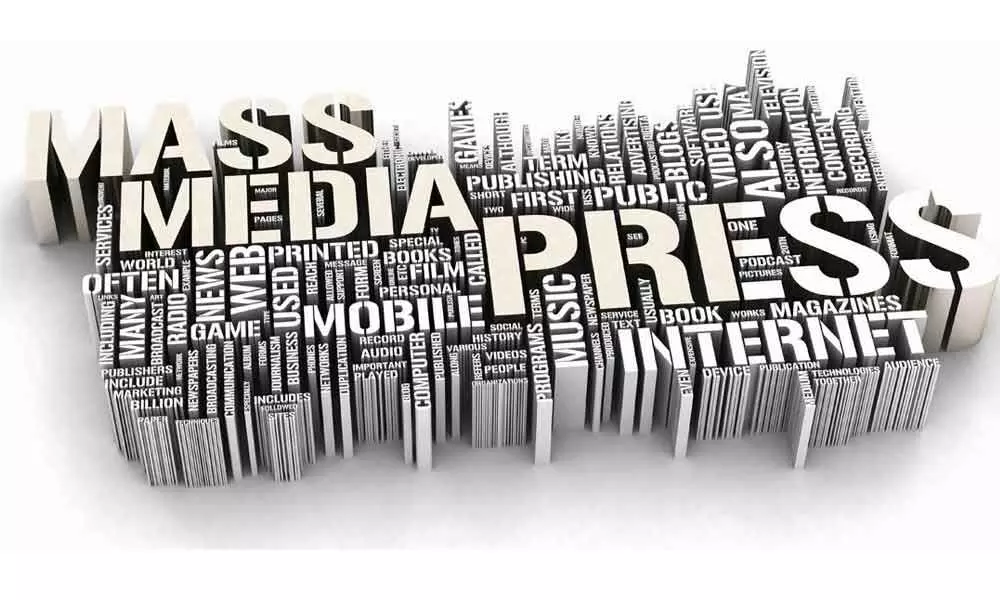Live
- Youth expressed protest by flying drones over road issue
- Kamal Haasan pays tribute to Jnanpith awardee MT Vasudevan Nair
- Aadi Pinisetty’s ‘Shabdam’ locks release date
- AAP’s Ultimatum to Congress: Take Action Against Maken or Face Expulsion from I.N.D.I.A.
- Beware of Fake RBI Voicemails Scam: How to Stay Safe
- Raj govt to allot land for hostel in Sahibzades' name: CM Sharma
- Anna University rape case: BJP says accused belongs to DMK student wing
- 'Dooradarshini' Brings the 90s to Life with a Nostalgic Love Story
- BJP Accuses Congress of Anti-India Politics After Distorted Map Displayed at CWC Venue
- ISL: Fluent Odisha face depleted Mohammedan in search of top four spot
Just In
Stifled free press waiting for salvation


The Constitution of India has created checks and balances for each organ so that there can be a smooth functioning of a democratic government.
The Constitution of India has created checks and balances for each organ so that there can be a smooth functioning of a democratic government.
Since ours is a parliamentary form of governance, an effort has been made by the framers of the Constitution to keep the organs of the government separated from each other.
The Constitution has made it clear as to what is essential power of an organ of the government and what are incidental powers for smooth cooperative running of the nation.
This is perhaps what the Prime Minister Narendra Modi also meant when he gave the slogan of 'Sab ka Saath Sab ka Vikas.' It makes clear that demarcation about the powers of one wing of the society can wield over the activities of another.
For example, the judiciary has right to check certain decisions of the legislature if they are unconstitutional, but it cannot take over the power of law-making.
The framers of the Constitution, after thorough debate, felt that the legislative and executive wings are closely connected with each other for all its actions and derive power from legislatures.
Though the President is the head of executive, the real powers are vested with the Prime Minister at the Centre and Chief Ministers in States.
The President can exercise powers while issuing ordinances etc. The judiciary too performs certain administrative functions while the Parliament can also perform judicial functions like impeachment of President or removal of Supreme Court judge.
Thus all three organs act as a check and balance to each other and work in coordination and cooperation to make our parliamentary system of governance work.
Why all this explanation has become necessary is because, of late, a new tendency is cropping up in the administration particularly in the States ruled by regional parties.
'What we say is law,' is the new trend and the checks and balances seem to have been thrown to winds. This tendency is seen in many walks of life which includes day-to-day administration, handling of strikes by employees on the administrative side and efforts to eliminate opposition on the political side.
Not just that, even in regard to mundane issues like release of government advertisements, the concept of following the rule book seems to have been thrown to winds by the Central and State Information and Public Relations departments.
The rules were framed to avoid any kind of discrimination and to help small and medium newspapers. That was meant to act as checks and balances but in the last six years, the rules have taken a backseat.
It now all depends on the likes and dislikes of the party in power. Why is such a situation there? It is pertinent to recall what the Vice President of India M Venkaiah Naidu had said at a function on the occasion of National Press Day.
He said every party has launched their own newspapers and channels and that has resulted in free and responsible press remaining as symbolic one. This aberration he felt has also resulted in the newspapers forgetting that their job was to call a spade a spade.
Interestingly, the country is passing through a phase where the rulers do not like anyone calling a spade a spade whether it is the media or the bureaucracy.
But then, let's hope that the wheel will take its full turn and the lost glory will be restored and healthy democracy would be back in place.

© 2024 Hyderabad Media House Limited/The Hans India. All rights reserved. Powered by hocalwire.com






